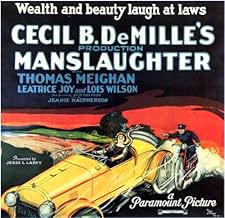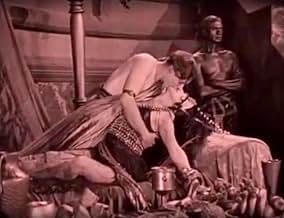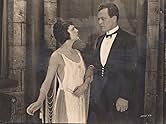Aggiungi una trama nella tua linguaThrill-seeking society girl Lydia causes a motorcycle policeman's death and is prosecuted by her fiancé Daniel, who describes in lurid detail the downfall of Rome. While she's in prison, she... Leggi tuttoThrill-seeking society girl Lydia causes a motorcycle policeman's death and is prosecuted by her fiancé Daniel, who describes in lurid detail the downfall of Rome. While she's in prison, she reforms and Daniel becomes a wasted alcoholic.Thrill-seeking society girl Lydia causes a motorcycle policeman's death and is prosecuted by her fiancé Daniel, who describes in lurid detail the downfall of Rome. While she's in prison, she reforms and Daniel becomes a wasted alcoholic.
- Regia
- Sceneggiatura
- Star
- Premi
- 1 vittoria in totale
- Dicky Evans
- (as Mickey Moore)
Recensioni in evidenza
There are the usual Demille scenes of people having a great time getting drunk in wild costumes, and even worse, dancing; later, during Meighan's summing up, there's a flashback sequence in which barbarians in hairy vests and winged helmets break into where the Vestal Virgins are sleeping one off. Finally, there's redemption for the ladies in vague homilies and multi-denominational Christianity. Meanwhile, Meighan has been been going through his own spiral, thanks to the demon rum, but there's hope even for him, in the love of a good woman.
My vague and sarcastic gassing is not intended to put down this version, so much as to be entertaining while giving away as little as possible to those who have not seen this movie. Let's be honest: there are some people whose opinion is worthwhile, who claim this is the worst movie Demille ever made. I can see why. It's at the end of his cavort-for-six-reels-and-repent-in-the-seventh phase, and the public was growing a tad tired of them by this point. I don't think it's worse than any of the others. In fact, I think it rather typical. Had public tastes not changed, he would have kept on making them.
No, if there are issues, it's that remaining with the same format meant Demille's evolution from one movie to the next had to be incremental rather than revolutionary. Also, I don't think Miss Joy brings much to the part that a more skilled comedienne might have. However, Bebe Daniels was off doing comedies for another division of Paramount, and Gloria Swanson likewise. Contrariwise, Meighan is fine, and Miss Wilson, while poorly served, doesn't let the side down. The result is an entertaining movie that if not the overwhelming success that Demille had grown used to by this point, is certainly worth your time.
The story, of a shallow fun-loving rich girl discovering that the true meaning of life is service to others, is rather too moral to be taken seriously - especially as DeMille can't help creating two completely gratuitous, but highly enjoyable, "flash-backs" to Ancient Rome, featuring wild orgies (and even a lesbian kiss!!). It's the usual clash between DeMille's fascination with sex and sado-masochism and his need to moralise against such things.
It all adds up to a visually stunning entertainment. Don't miss it!
It wasn't due to the lack of research in the preparation of the Jeanie MacPherson script, based on woman suffragette Alice Miller's 1921 novel of the same name. MacPherson wanted to experience the process being booked for a crime and living in jail as the protagonist, played by Leatrice Joy, had experienced in the story. DeMille approved of a scheme to have her get arrested for stealing a friend's fur, who was also in on the act, and be a prisoner for a few days. The police eventually found out about the ploy and released her. But the experience, details which were incorporated in her screenplay, jolted MacPherson so much she wrote an article titled 'I Have Been In Hell.'
So what makes "Manslaughter" so campy? The over-the-top dramatics of several actors, especially Thomas Meighan, the boyfriend lawyer of the carefree Lydia, is one whose dramatics is reminiscent of a bygone era. He sees his girlfriend headed down a slippery slope because of her wild behavior even before she accidentally kills a police officer during a high speed chase. He readily voluteers to be the prosecuting attorney charging her with manslaughter. His motive: to get her life back in order. After her conviction and imprisonment, Meighan displays such inner turmoil that one could see his neck blood vessels almost burst.
Even Leatrice Joy's performance is reminiscent of those seen in film during the early 1900's. The actress claimed she based her screen persona on attending a Los Angeles trial of a woman up for murder. But Joy's melodramatics carry such heady mannerisms that when someone showed the movie at her daughter's birthday 40 years after "Manslaughter" was released, the former actress "thought it was hilarious."
Of course, what would a DeMille movie be without a spectacular scene or two. In two fantasy sequences paralleling the plot, one has Joy overseeing an ancient Roman drunken fest where all participants are passed out, only to be intruded by aggresive barbarians. The other is a dream sequence where Joy shoots her boyfriend at a heavily-attended trial, sending the courtroom spectators scurrying around like disturbed ants.
There is one weird aspect of this film, and that is the Roman orgy scene. This "flashback" occurs while Meighan is summing up his case against Joy. The scene is complete with tigers, gladiators, people prancing around in weird outfits, and, if my eyes did not deceive me, two women making out. Later, there is another "flashback," with Meighan in some weird barbarian garb dragging Joy up some steps with a whip around her hands. Apparently this was DeMille's way of saying the country was going to hell in a hand cart. I quote from him: "I wished to show that a nation that is addicted to speed and drunkenness is riding for a fall. The best way to achieve this result was to picturize the greatest nation that ever suffered from these vices and show what happened to it. From this, it is easy to draw a modern parallel."
Other powerful means were also available to early cinema: just think of close-ups, or the expression of a face... Similar cinematic tricks were not possible in the theatre: they were some of the tools of cinema as a new means of expression, or - in rare cases - art.
Among the filmmakers, some realized it earlier, some later...
Lo sapevi?
- QuizIn order to correctly write a script that would depict the experience of a woman being arrested and imprisoned, screenwriter Jeanie Macpherson arranged, at Cecil B. DeMille's behest, to be imprisoned for stealing a fur piece from a friend (with whom she had worked out an agreement beforehand). She was arrested in Detroit, booked and fingerprinted under the name Angie Brown and spent three days in jail before a police official discovered the truth and arranged for her release. Macpherson wrote about the experience in an article called I Have Been in Hell.
- Citazioni
Lydia's Chaperon: Make Dan keep an eye on her, Eleanor. If she will show up for anybody, she will for him - but as her chaperon, I won't stay and be party to such goings on!
- ConnessioniFeatured in Le Dee dell'amore (1965)
I più visti
Dettagli
- Data di uscita
- Paese di origine
- Lingua
- Celebre anche come
- Državni tužilac
- Luoghi delle riprese
- Azienda produttrice
- Vedi altri crediti dell’azienda su IMDbPro
Botteghino
- Budget
- 385.000 USD (previsto)
- Tempo di esecuzione
- 1h 40min(100 min)
- Colore
- Mix di suoni
- Proporzioni
- 1.33 : 1

























